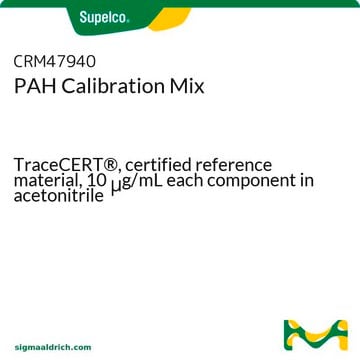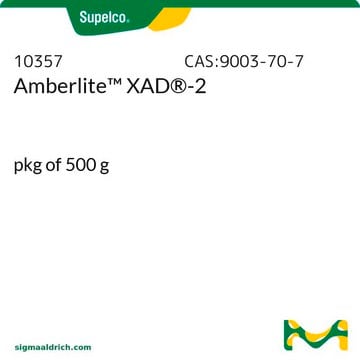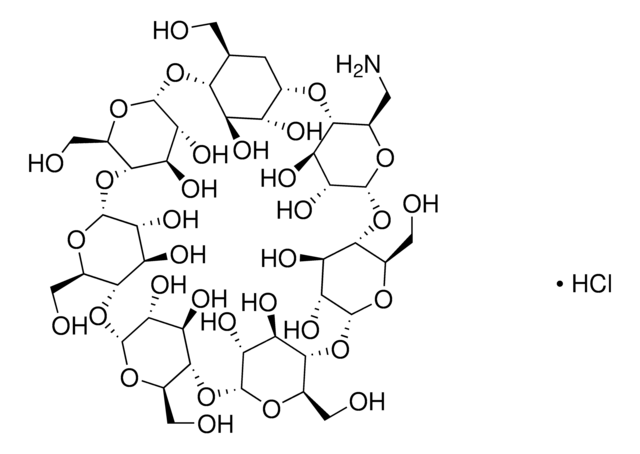39915
Heptakis(2,6-di-O-methyl)-β-cyclodextrin
≥98.0% (TLC)
Synonym(s):
2,6-Di-O-methyl-β-cyclodextrin, Dimethyl β-cyclodextrin
About This Item
Recommended Products
Assay
≥98.0% (TLC)
optical activity
[α]20/D +158±3°, c = 10% in H2O
impurities
≤3% water
SMILES string
COC[C@H]1O[C@@H]2O[C@H]3[C@H](O)[C@@H](OC)[C@H](O[C@@H]3COC)O[C@H]4[C@H](O)[C@@H](OC)[C@H](O[C@@H]4COC)O[C@H]5[C@H](O)[C@@H](OC)[C@H](O[C@@H]5COC)O[C@H]6[C@H](O)[C@@H](OC)[C@H](O[C@@H]6COC)O[C@H]7[C@H](O)[C@@H](OC)[C@H](O[C@@H]7COC)O[C@H]8[C@H](O)[C@@H](OC)[C@H](O[C@@H]8COC)O[C@H]1[C@H](O)[C@H]2OC
InChI
1S/C56H98O35/c1-64-15-22-36-29(57)43(71-8)50(78-22)86-37-23(16-65-2)80-52(45(73-10)30(37)58)88-39-25(18-67-4)82-54(47(75-12)32(39)60)90-41-27(20-69-6)84-56(49(77-14)34(41)62)91-42-28(21-70-7)83-55(48(76-13)35(42)63)89-40-26(19-68-5)81-53(46(74-11)33(40)61)87-38-24(17-66-3)79-51(85-36)44(72-9)31(38)59/h22-63H,15-21H2,1-14H3/t22-,23-,24-,25-,26-,27-,28-,29+,30+,31+,32+,33+,34+,35+,36-,37-,38-,39-,40-,41-,42-,43-,44-,45-,46-,47-,48-,49-,50-,51-,52-,53-,54-,55-,56-/m1/s1
InChI key
QGKBSGBYSPTPKJ-UZMKXNTCSA-N
Looking for similar products? Visit Product Comparison Guide
General description
Application
- To measure the equilibrium constant of its complexes with various enantiomeric pairs of chiral nitroxides by electron paramagnetic resonance (EPR) spectroscopy.
- To study the crystal structure of its complex with n-butyl acrylate and isobornyl acrylate using X-ray diffraction (XRD).
- As a chiral selector to resolve amphetamine related drugs and reduced haloperidol by capillary zone electrophoresis.
- As a component of thermosensitive polyurethane copolymers for their subsequent analysis by gel permeation chromatography (GPC).
- Physicochemical studies of inclusion complexes
- Probing diffusion and single molecule interactions with reconstituted membrane proteins
- Interactions with micelles causing micellar rupture
- Studying cellular transport, used as a cell penetration enhancer
- Physicochemical and biopharmaceutical improvement of drugs particularly with solubilization and stability
- Interactions with cholesterol
Other Notes
Storage Class Code
11 - Combustible Solids
WGK
WGK 3
Flash Point(F)
Not applicable
Flash Point(C)
Not applicable
Personal Protective Equipment
Certificates of Analysis (COA)
Search for Certificates of Analysis (COA) by entering the products Lot/Batch Number. Lot and Batch Numbers can be found on a product’s label following the words ‘Lot’ or ‘Batch’.
Already Own This Product?
Find documentation for the products that you have recently purchased in the Document Library.
Customers Also Viewed
Our team of scientists has experience in all areas of research including Life Science, Material Science, Chemical Synthesis, Chromatography, Analytical and many others.
Contact Technical Service












